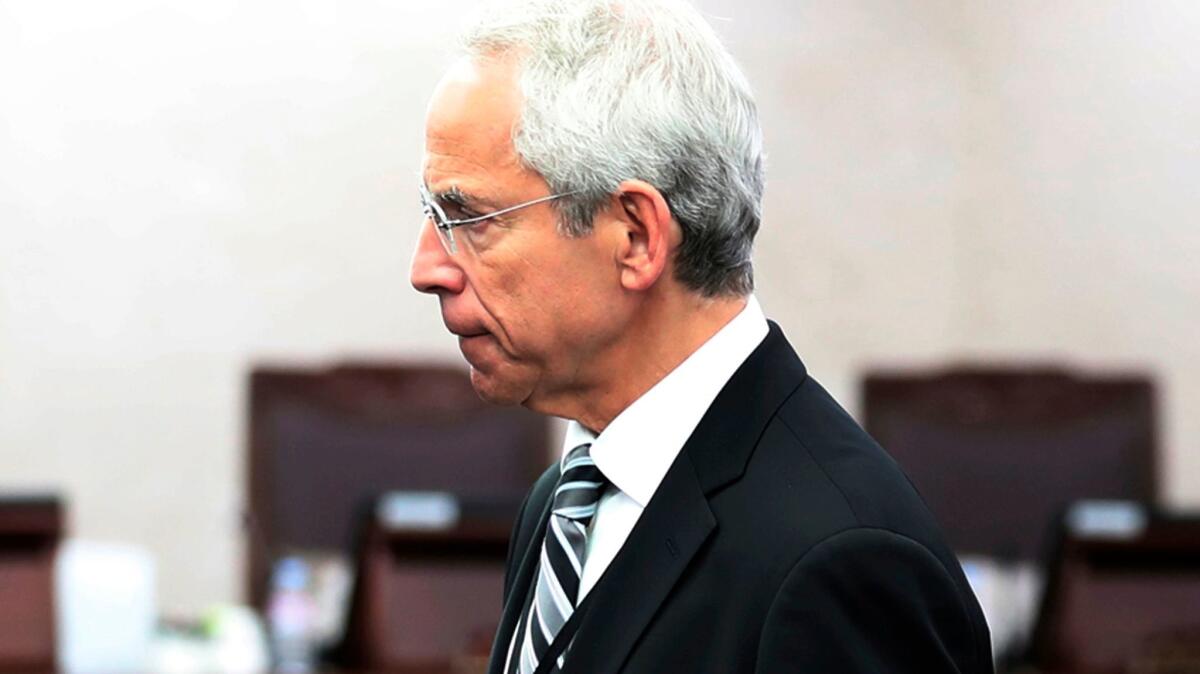Qualcomm is fined $865 million by South Korean antitrust regulator

- Share via
Qualcomm Inc. said it will fight a ruling by South Korea’s top trade regulator that fined the wireless company $865 million for allegedly violating competition laws with its patent licensing practices.
The fine comes after an investigation by the Korea Fair Trade Commission, which appears to want San Diego-based Qualcomm to change “unfair” business practices in the way it licenses its 3G and 4G technology.
“Qualcomm has refused to license competing chipset companies while coercing unilateral license terms on handset companies in order to strengthen its monopolistic power in the patent license market and the chipset market,” the commission said.
The ruling was a blow to Qualcomm, which called the action unprecedented. The company said regulators were upending patent royalty practices that have been in place for more than two decades worldwide and have benefited South Korean companies including Samsung Group and LG Electronics Inc.
“Qualcomm strongly believes that the Korea Fair Trade Commission findings are inconsistent with the facts, disregard the economic realities of the marketplace and misapply fundamental tenets of competition law,” Don Rosenberg, the company’s general counsel, said in a statement.
The company said its patent royalties collected on smartphones sold in South Korea amounted to less than $230 million for its 2016 fiscal year, which ended in September — suggesting that the fine was unreasonable for the size of the Korean market.
Qualcomm has been a longtime supplier of smartphone chips to LG and Samsung, the world’s largest seller of smartphones that use the Android operating system. Samsung also manufactures Qualcomm’s Snapdragon chips at its semiconductor factories.
Qualcomm makes money not only by designing mobile semiconductors, but also by licensing its vast portfolio of wireless patents on key cellular technology. It charges patent royalties based on the wholesale price of the smartphone. It typically licenses its entire patent portfolio, which includes thousands of diverse wireless patents.
South Korean regulators object to Qualcomm’s practice of licensing its entire portfolio, and they say Qualcomm forces firms that buy its semiconductors to also license its patents in violation of South Korea’s competition laws.
The commission launched its investigation around the time that China’s top antimonopoly regulator fined Qualcomm $975 million to settle an antitrust investigation.
As part of that settlement, Qualcomm agreed to change its patent licensing scheme within China’s borders, basically allowing certain China-only smartphone makers to license patents at a lower royalty rate. Qualcomm offers the same deal to all phone makers worldwide for sales within China.
Bernstein Research analyst Stacy Rasgon said this week’s fine was the largest issued by the Korea Fair Trade Commission. In a research note, Rasgon said regulators appear to be demanding that Qualcomm change its business model, including separating out standard essential patents from nonessential patents.
In 2010, the same South Korean regulator fined Qualcomm $208 million over its patent licensing practices for 3G technologies. The company paid the fine but appealed. It lost in a lower court and asked the Korea Supreme Court to hear the case. There has been no further action.
Qualcomm said it has yet to receive a written order from the Korean commission in this latest dispute. That usually takes four to six months. Once it gets the documents, Qualcomm said, it will seek a stay of the action and appeal both the regulatory findings and the fine to the Seoul High Court.
Still, under Korean law Qualcomm must pay the fine within 60 days of getting the written order. It could receive a refund if it wins on appeal.
During the investigation, Qualcomm asked a U.S. federal court in San Jose to intervene in the matter. It asked the judge to order Apple Inc., Samsung and other firms to turn over the information about Qualcomm that they shared with the Korea Fair Trade Commission. The company said the commission was not disclosing information as required.
“Qualcomm’s repeated requests during the [commission’s] investigation for basic due process rights such as access to case files and the right to cross-examine witnesses were denied,” Rosenberg said.
Qualcomm’s shares fell 2.2% on Wednesday to $65.75.
mike.freeman@sduniontribune.com
ALSO
Photoshop is hard to learn. Adobe thinks artificial intelligence can help
Chinese investors were defrauded by Orange County lawyer, SEC says
‘L.A. Law’ building owners launch update of office tower with high-rise courtyards
UPDATES:
1:45 p.m.: This article was updated throughout with staff reporting.
This article was originally published at 7:10 a.m.






